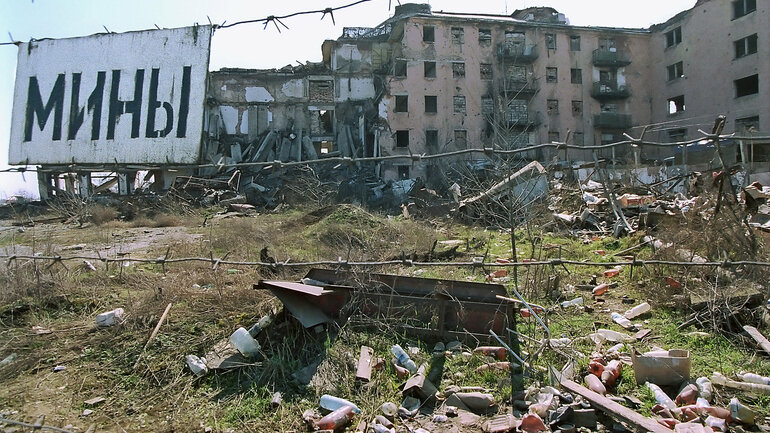Shifting perspective: Chechnya from within

The Caucasus and the Caucasian wars have been an important theme in Russian literature since the 19th century. For generations, the popular Russian image of the region and its inhabitants was shaped by the writings of Alexander Pushkin, Mikhail Lermontov and Leo Tolstoy. Even though Russia was engaged in decades of warfare against the indigenous population of the North Caucasus at the time (1817–1864), these writers’ portrayal of their Chechen or Circassian figures is a sympathetic one. The resulting stereotype of a brave and reckless warrior who is passionate in his struggle for freedom is by no means entirely negative. Indeed, for many of the Russian protagonists portrayed in these works, the Caucasus becomes an exotic place of nostalgic longing, where life is freer than in Tsarist Russia.
The Russian wars against Chechnya (1994–1996 and 1999–2009) which followed the disintegration of the Soviet Union have overturned this ambivalent image. In the literature about these conflicts, a negative, often formulaic portrayal of Chechens – whether combatants or civilians – predominates. In most of the texts written by veterans, the Chechen figures are described in pejorative terms – as “blacks”, “chekhos” or simply as “enemies” – and are rarely given their own literary voice. In these writings, the war is mainly seen through the eyes of the Russian soldier. Accordingly, it is his fear, dread and hardships (as in the prose works by Arkady Babchenko) or his courage and heroism (described by Nicolai Lilin, for example) that take centre stage. In contrast to the literature of the 19th and early 20th century, the Chechen people’s view of the war barely features in contemporary Russian writing.
Different voices
Anna Politkovskaya’s reporting of the second Chechen war – when restrictions were imposed on the Russian media, in contrast to the situation during the first Chechen war – attracted international attention. As a “civilian through and through”, Politkovskaya travelled to the conflict zone in order to report on “the suffering of other profoundly civilised people”[1]. In her accounts, Politkovskaya gives a voice to those who were suffering most as a consequence of the conflict and the war crimes being committed by all sides: the women and children, the elders and youth of Chechnya. While Politkovskaya builds very close bonds with her protagonists and their authentic voice is heard in her reports, her version of events is still an outsider’s.
A rare glimpse from within is afforded by Polina Zherebtsova in her diary, Ant in a Glass Jar, published in German as Polinas Tagebuch. On 25 March 1994, a few days before her ninth birthday and shortly before the outbreak of the first Chechen war, Polina – who lives in the Chechen capital Grozny – starts writing a diary. Her journal is a remarkable document in many respects. First, there is its unusual perspective – a young girl, later a young woman, recounts her first-hand experiences in the midst of war, using her accustomed language (“Planes were dropping bombs. And then a missile went ‘boom’.”), which becomes more sophisticated as time passes (“Missiles and shells flew into the yard. Thumps from mortars and machine-guns.”) We also learn about Polina herself and what interests her – she writes not only about the dead bodies she sees lying in the streets but also about pretty hair pins, for example, while after a time, the war itself takes second place to her very first experience of love and its tribulations.
A persecuted chronicler
Also astonishing is the persistence with which Polina writes her diary despite the horrors of war. For a full ten years – right up to the time she leaves Chechnya for central Russia in 2004 – she records, with dates, whatever she sees happening around her, starting in 1994, when “old men with beards” topple a Lenin statue in Grozny, to the outbreak of the second Chechen war in 1999, which she experiences on the way to the market (“War in Chechnya. The shelling started today at 10.25 a.m. (…) Smoke! It was horrible!”) and the media coverage of the hostage-taking in the Dubrovka Theatre in Moscow in 2002, which she believed was likely to spark a “witch hunt” against the people of the Caucasus. Unusually, she also has a specific readership in mind: at first, writing a diary is a way for Polina to engage in a dialogue with herself – typical for the genre. However, as the hostilities continue, she increasingly sees herself as a chronicler of events, with her testimony potentially outliving Polina herself: “I intentionally write very precisely about everything. Afterwards, my diary will be discovered, just like the diary by the young girl in Leningrad. People will read it and understand that they should never ever start a war in their own country.”
The diary – or, more accurately – the diaries were first published in their entirety in Russia in 2011. Afterwards, Polina Zherebtsova by her own account faced massive threats from unknown persons. In 2012, she therefore applied successfully for political asylum in Finland and has since been granted Finnish citizenship. Nevertheless, her preoccupation with her subject matter did not end with the diaries’ publication. In 2015, she published a collection of stories, followed by a novella and a novel in 2017. All these – hitherto untranslated – prose writings are strongly autobiographical. Her attempts to find a publisher in Russia for her novel, which deals with her life after she left Chechnya, were unsuccessful, however. Instead, it was published in Ukraine. Certain perspectives have no place in today’s Russia.
[1] All quotes are from: Anna Politkowskaja: Tschetschenien. Die Wahrheit über den Krieg, Cologne 2003.
Nina Frieß is researcher at ZOiS. Her current project focuses on literature and power in the post-Soviet space.